Stock Market Turmoil in Iran as Brokers Strike
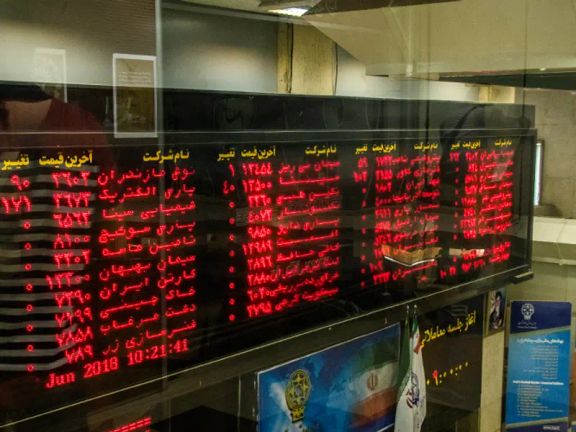
Trading was brought to a halt in stock exchanges in Isfahan and Tabriz on Monday as brokers initiated a strike against the downturn in Iran’s stock market.

Trading was brought to a halt in stock exchanges in Isfahan and Tabriz on Monday as brokers initiated a strike against the downturn in Iran’s stock market.
The market has been in a decline, enduring a drop of over 5,600 points at the opening of Monday's trading, with 90 percent of the market bathed in red and over 60 percent of stocks queued for sale.
The recent plunge echoes the crash of July 2020, where Tehran’s stock market plummeted by over 30 percent in a single week, obliterating the savings of countless small investors lured by government assurances of a secure market. Allegations persist that government entities had artificially inflated the market, extracting hefty profits before its collapse.
The memory of the crisis lingers among investors, heightening anxiety with every market fluctuation. Critics of the government point to the early 2020 decision by President Hassan Rouhani's government to offload state assets on the Tehran Stock Exchange (TSE) as an act of market manipulation. Initially, the index surged to 2 million points, buoyed by small investors coaxed by the government amidst the rial's devaluation. However, it recoiled to 1.2 million points, erasing the wealth of the investors.
At the time, hardliner critics within the government accused the Rouhani administration of deliberately attracting public investment to alleviate a budget shortfall through sales of stocks, predominantly in public and quasi-public companies.
Controlled largely by the government and its affiliated conglomerates, which command approximately 80 percent of the economy, the Tehran stock market is just one cog in a machine of state-controlled economic entities. With Iran's economic chiefs often appointed by the government itself, the stock market's operational independence is compromised.
As the rial continues to lose value and inflation hovers near 50 percent, many Iranians are scrambling to convert their savings into more stable assets like hard currencies or gold.

Iranian Nobel Peace Prize laureate Narges Mohammadi slammed the United Nations for honoring the late President Ebrahim Raisi.
In a critique shared from Evin Prison, Mohammadi called the memorial "a celebration of the gallows” after 2023 had been record year of executions with scores more killed in the last month alone.
Mohammadi's remarks came in response to the recent memorial held at the UN, which she said "truly commemorates the gallows, executions, and mass killings" rather than the values the UN purports to uphold. However, in spite of mass rights abuses at home leading to sanctions globally, the UN allowed Iran to chair a human rights forum event last year.
Mohammadi criticized global leaders for glorifying a man she described as "a blatant human rights violator and the executioner of Iran's history, who was an instrument of oppression until his death."
The outspoken activist, who has faced repeated imprisonments for her defense of human rights, argued that such commemorations threaten to normalize dictatorial and oppressive regimes worldwide. "When world governments treat such a figure as if they have lost a peace-loving and democratic individual, it sets a dangerous precedent," Mohammadi stated, warning of the potential rise of similar figures in other parts of the world.
Mohammadi's current imprisonment followed her arrest during the nationwide anti-government protests ignited by the death of 22-year-old government's repressive policies.
Shirin Ebadi, an Iranian lawyer and Nobel Peace Prize winner, also asked the United Nations to cancel the memorial ceremony and not to “mock” its subordinate institutions as the event stirred controversy amid Iran’s domestic and international record of rights abuses and military activity.
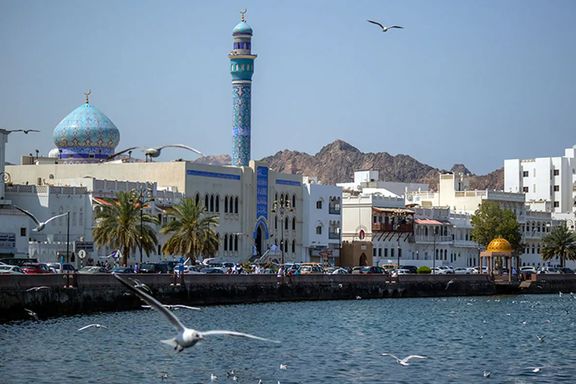
Amid international sanctions, Iran has touted Oman as a key player in its strategy to bypass global trade restrictions.
Hamidreza Salehi, a member of the joint Iran-Oman Chamber of Commerce board, said that Oman serves as a conduit for re-exporting Iranian goods into global markets, adding a 30 percent value to bypass export restrictions.
“Although these goods are marketed under the Omani brand in global markets, this trade holds substantial profits for Iranian traders,” he added.
Last year, trade between Iran and Oman surged to about $1.2 billion, with $700 million stemming from Iranian exports.
It is part of a broader scheme involving the Revolutionary Guards (IRGC) and its network of oil laundering operations. These networks, which span across countries like the UAE, Turkey and Malaysia, facilitate covert financial transactions and support Tehran's proxy activities.
Despite the sanctions imposed since 2018 and earlier, the Iranian government, under President Ebrahim Raisi, has boasted about its ability to circumvent them, sustaining the nation's economy with a flow of foreign currency from nearly 1.5 million barrels of oil exported daily, primarily to China. The figure marks a significant increase from the mere 200,000 barrels per day exported following the re-imposition of US sanctions in 2019.
Critics within Iran have pointed out that such operations, often controlled by the IRGC, not only undermine the potential for economic reform but also benefit an elite group within the regime, known as "sanctions profiteers."
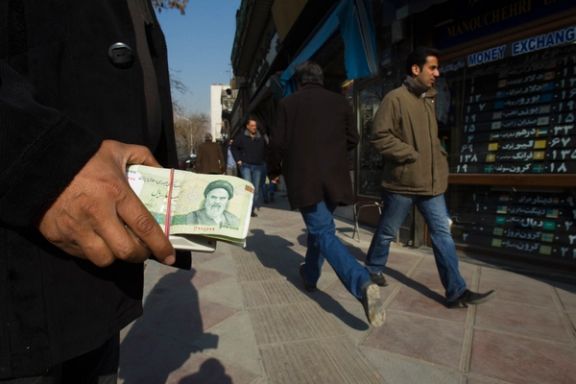
Iran’s battered currency, the rial, has recovered more than half of its losses during May as the likelihood of war with Israel decreased and the US continued negotiations with Tehran.
The sudden death of President Ebrahim Raisi last week in a helicopter crash briefly weakened the national currency, but it recovered surprisingly fast, although it is far from pre-January levels.
The rial, which was trading at around 510,000 per dollar in December 2023, began to fall steadily from early January as tensions rose in the Middle East and Tehran continued to threaten Israel. By mid-March it was trading at around 600,000 to the dollar but fell to 670,000 as Israel attacked Iran’s diplomatic compound in Damascus on April 1.
Two top Revolutionary Guard generals and five other key officers were killed when Israeli missiles flattened a building near the embassy, prompting Iran to vow revenge, and Israel threatening to retaliate.
This raised the likelihood of both an economic and a political crisis for Tehran’s rulers, as the specter of more inflation on top of the current 50-percent annual rate sparked a sense of panic.
Tehran finally delivered on its promise by launching more than 300 drones and missiles against Israel on April 13-14, 99% of which were shot down by Israeli air defenses and allied warplanes.
However, the Israeli response a few days later was very limited and measured, gradually dissipating the fears of a major confrontation.
By late April, the rial began to rise and by mid-May the dollar fell to around 580,000 rials in Tehran’s black market, meaning a strong come back for the rial from the April lows. It has stayed at that level for almost two weeks.
Although the reduction of tensions with Israel is seen by analysts as the main reason for rial’s rebound, government intervention in the markets is always a factor in Tehran.
There are limited sources for the black market to obtain hard currencies, such as US dollars, euros, British pounds or Canadian dollars. The black market’s cash currency flows are mostly from small or individual sources. As a result, when the rial falls sharply and the government decides to intervene, it injects a few tens of millions of US dollars’ worth of hard currencies into the market.
The amount and frequency of these interventions are usually treated as state secrets, but occasionally hints appear in the media.
However, bad news about higher prices for consumers continue to be sporadically reported in Tehran media and on social media. Usually, it takes a few weeks for rial’s fall to impact prices and the annual inflation rate. Local media have reported in the past two weeks have that housing costs and food prices have been rising, with a middle-class family now forced to pay at least $250 a month for rent, which is more than ordinary salaries. Consumption of meat also continues to decline, as one kilogram of meat could cost 5% or more of monthly wages.
The new president, to be elected at the end of June, will face the monumental task of addressing economic challenges that have become increasingly difficult due to ongoing oil-export and banking restrictions. Without exceeding roughly $70 billion in oil exports, the government continually faces significant budget deficits and is forced to print money.
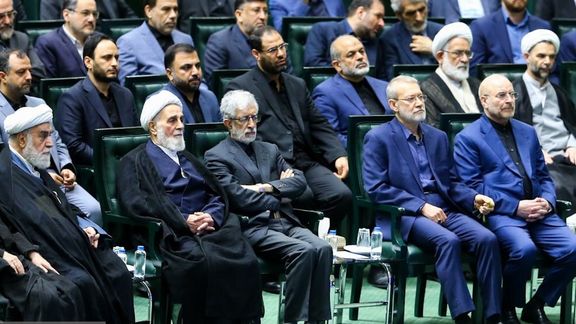
The 12th round of Iran's parliament opened Monday, shadowed by a historical low in voter turnout and public trust.
The event, attended by 276 members, was marked by the absence of popular engagement, illustrating a crisis of legitimacy within the Islamic Republic.
During the ceremony, where the oldest members formed a transitional presiding board, Alaeddin Boroujerdi, the former Chairman for the Committee for Foreign Policy and National Security of the was appointed the temporary speaker.
Despite the presence of high-profile guests including foreign dignitaries and senior Iranian officials, the mood was undercut by the recent death of President Ebrahim Raisi and his companions and ongoing political disenfranchisement.
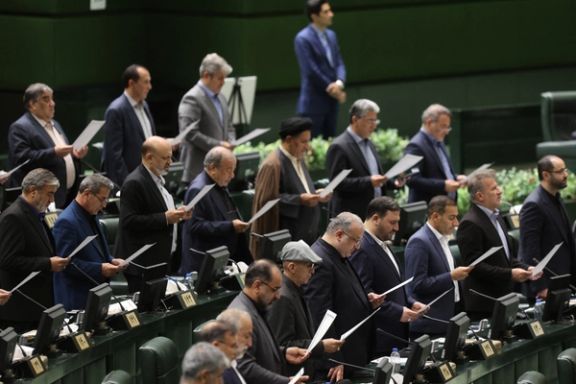
The elections that preluded Monday's assembly were distinguished by their low participation. Official figures touted a turnout of 28 to 34 percent across various provinces during the March elections, but independent observers suggest the real numbers were far lower. The May 10 runoff saw an even more voter apathy, with an estimated 90% of Tehran's electorate abstaining.
The widespread disinterest is rooted in the suppression of the 2022-2023 Woman, Life, Freedom protests and the disqualification of numerous candidates by the Guardian Council, which left the electoral field dominated by hardliners. Such actions have only solidified the belief among many Iranians that the current system is incapable of addressing the nation's deep-seated issues, from escalating poverty to systemic corruption.
Supreme Leader Ali Khamenei's message to the new parliamentarians urged them to “foster calm and hope.” Yet, such calls ring hollow against the backdrop of an election where even conservative bases showed reluctance to support a system seen as alienated from the public's needs.
Khamenei also urged them to avoid “useless media competitions and harmful political disputes."
Former parliament chiefs Ali Larijani and Mohammad Bagher Ghalibaf, present at the ceremony, who are potential presidential contenders, represent a political establishment struggling to maintain relevance in a society marked by disillusionment and despair.
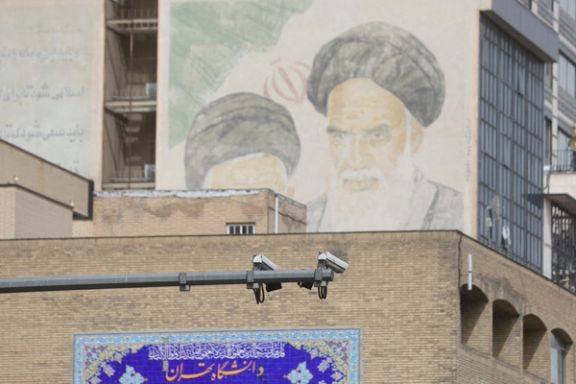
Iran has set forth stringent measures under the proposed Hijab and Chastity Bill to enforce mandatory hijab laws, utilizing surveillance cameras as a key tool in monitoring compliance.
Amir Hossein Bankipour, a member of the Supreme Council of Cultural Revolution and the Iranian parliament, revealed that under the Bill, individuals failing to adhere to hijab regulations will face identification by using cameras.
In cases where women refuse to be photographed, an immediate arrest is mandated, with individuals handed over to authorities for identification.
Bankipour detailed the Bill's provisions in an interview with Fars News Agency, affiliated with Iran’s Revolutionary Guard Corps (IRGC), on Saturday. He emphasized the requirement for all including the private sector to provide access to their CCTV cameras to Iran’s Law Enforcement Command (FARAJA) forces for hijab enforcement.
“We mandate that all entities, including the private sector to provide their cameras to FARAJA. All cameras must be connected to FARAJA,” Bankipour stated.
Bankipour added that once photographed, individuals' identities will be confirmed through "trusted observers," and fines will be issued via text messages.
Addressing scenarios where a person's face might be obscured by a mask or technical systems are offline, Bankipour emphasized:
“In fact, we added an article requiring the use of identification or documents in situations where it is not possible to identify a person. The individual must be identified directly.”
Bankipour's statement adds to growing concerns regarding undocumented women who defy mandatory hijab laws, as they would face an elevated risk of being arrested.
Furthermore, Bankipour outlined punitive measures for hijab non-compliance, including financial fines, social exclusion, exile, closure of social media pages, passport confiscation for up to two years, and arrest.
Regarding the Bill currently under review by the Guardian Council, Bankipour expressed confidence in its approval. He cited its alignment with the country's legislative system and potential implications for Iran's economic stability, referencing a letter from Sadegh Amoli Larijani to Ayatollah Ahmad Jannati, Secretary of the Guardian Council.
Although as part of Iran’s Nour Plan, initiated in April, Iranian authorities have been increasingly cracking down on women defying hijab laws, the apparatus for enabling the use of surveillance technology has been in the works for some time. In June last year, Ahmad-Reza Radan, Iran's police chief, announced that President Ebrahim Raisi had allocated funds to install additional cameras to combat defiance against hijab rules.
The use of CCTV to enforce hijab regulations has previously raised concerns about women's privacy and the potential exploitation of surveillance for monetary purposes through fines. Rights groups such as Article 19 have warned against the use of facial recognition software and AI-assisted technology to enforce mandatory hijab laws.
More recent examples of such invasive technology including the use of drones to enforce hijab laws at Tehran’s Book Fair this month also sparked outrage and concern.
Articles of the Proposed Hijab and Chastity Bill on Use of CCTV Surveillance
Although not yet approved, below are some of the Articles that will allow Iran to freely use invasive surveillance technology against women who defy hijab laws:
Article 30 states that to fulfill the law, the police command must:
“Create and strengthen intelligent systems for identifying perpetrators of illegal behavior using tools such as fixed and mobile cameras.”
Article 61 requires the private sector including “non-governmental banks”, “passenger transport companies”, “business owners”, “stores”, and “officials of complexes” to “upload their camera footage and provide them to the police command of the Islamic Republic of Iran (FARAJA) in order to identify those who violate this [hijab] law, and further requires them to keep the footage for at least twenty days.
The article additionally mentions that failure to comply with this ruling could lead to a suspension from government and public services ranging from six months to five years. Furthermore, business owners and professionals might face a monetary penalty equivalent to two to six months' worth of profits from their business activities.
Article 36 allows “certified individuals”, including all officers trained by FARAJA, to report instances of hijab law non-compliance or “inappropriate clothing” by sending photos to the dedicated system established by FARAJA.